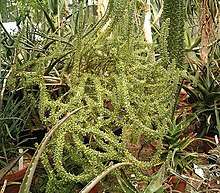Ceraria
Ceraria is a genus of succulent shrubs, native to South Africa and Namibia.
| Ceraria | |
|---|---|
 | |
| Ceraria namaquensis | |
| Scientific classification | |
| Kingdom: | |
| (unranked): | |
| (unranked): | |
| (unranked): | Core eudicots |
| Order: | |
| Family: | |
| Subfamily: | |
| Genus: | Ceraria Pearson & Stephens |
| Species | |
|
Ceraria carrissoana | |
Taxonomy
Recent phylogenetic tests have shown conclusively that Ceraria is located within the genus Portulacaria, and consequently all species have been accordingly renamed.[1]
Description
They are very slow-growing, semi-deciduous or deciduous, and succulent perennials with a few branches and many small, ovoid leaves along the stems. Branches are pale-barked smooth with papery cortex. These woody-stemmed desert shrubs have many short and ovoid gray-green leaves. Flowers, born on peduncles of 13–17 mm long, with some minute ovate bracts 4 mm long. Calyx with two phyllous, 5 rose-colored, obovate, 2 mm long petals. Five stamens with linear filaments.
Species
- Ceraria carrissoana
- Ceraria evora
- Ceraria fruticulosa
- Ceraria kaokoensis
- Ceraria kuneneana
- Ceraria longipedunculata
- Ceraria namaquensis
- Ceraria pygmaea
- Ceraria schaeferi
References
- P.Bruyns, M.Oliveira-Neto, G.F. Melo de Pinna, C.Klak: Phylogenetic relationships in the Didiereaceae with special reference to subfamily Portulacarioideae. Taxon 63 (5). October 2014. 1053-1064.
| Wikimedia Commons has media related to Ceraria. |